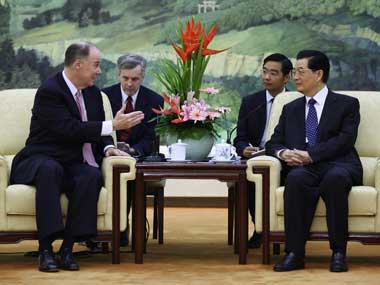New York: President Barack Obama’s national security advisor Thomas E. Donilon is working the Asian power capitals of Beijing and New Delhi this week to advance US interests ahead of two key regional summits in November on East Asia and Afghanistan. Obama will make his first appearance as US President at the East Asia Summit in November. The US has five treaty allies in Asia – Japan, South Korea, Australia, the Philippines and Thailand - and is keen to get closer to India and Indonesia. Washington obviously has an extraordinarily complex relationship with China. Sixteen countries, including South Korea and Vietnam, all wary of Beijing’s growing clout, are expected to attend the East Asia Summit. It is no secret that Washington wants India to play a more assertive role in the region. Secretary of State Hillary Clinton has been quietly drawing India into the overall Asian security and economic matrix as a counterpoint to China. [caption id=“attachment_114296” align=“alignleft” width=“380” caption=“US National Security Advisor Thomas E. Donilon with Chinese President Hu Jintao. Reuters”]  [/caption] The Obama administration is braced for a tough Chinese reaction to the $5.85 billion US arms sale to Taiwan and is worried it will come during Donilon’s visit to Beijing. Donilon’s visit comes amid growing trade tensions between the world’s two largest economies and strategic concerns like China’s growing aggressiveness on territorial disputes in the South China Sea. Donilon has meetings with Chinese leaders, including Vice Premier Wang Qishan and State Councilor Dai Bingguo. In what was not a happy portent, General Luo Yuan, a senior political commissar for the logistics department of the People’s Liberation Army was quoted in a Chinese-controlled news report as saying China should respond to the latest US arms sale to Taiwan with “crafty revenge” or “indirect revenge.” Following meetings in Beijing, Donilon will travel to New Delhi to meet National Security Adviser Shiv Shankar Menon. The two will prepare the ground for the East Asia Summit, which will spotlight growing disputes in the South China Sea, particularly between China and Asean nations that have competing territorial claims, including Vietnam, the Philippines and others. To China’s irritation, India expanded its forays into the South China Sea. Last week, India infuriated China when India’s state-owned Oil & Natural Gas Corp. and PetroVietnam signed an agreement to expand oil exploration in resource-rich waters near Vietnam. The Wall Street Journal reported that Washington has called for a “multilateral approach to dealing with the territorial disputes, which is favoured by smaller claimants in the region.” Beijing, on the other hand, prefers to deal with competing territorial claims on a bilateral basis. Both Philippine President Benigno Aquino and Vietnam’s ruling Communist Party chief Nguyen Phu Trong have visited Beijing in recent weeks, though there is little evidence to suggest the countries are any closer to solving one of the region’s most volatile strategic disputes. It can be safely assumed that Afghanistan will also figure prominently in Donilon’s meetings in New Delhi ahead of a regional conference on Afghanistan, being held in Istanbul on 2 November. America and NATO are looking to find ways to stabilise Afghanistan, after a decade of conflict that started after the 9/11 attacks. The Istanbul conference is likely to focus on the transition in Afghanistan, including Kabul’s security and training of Afghan security forces. The timing of Donilon’s visit to New Delhi is critical as it comes in the backdrop of tense ties between Pakistan and Afghanistan and frictions in the US-Pakistan relationship. For the last decade, mainly in order to assuage Pakistan, US requested that India limit its Afghan aid and assistance to areas like infrastructure, health and education. With Pakistan backing the Haqqani Network, Washington suspects Pakistan wants to bring together all the Taliban/Islamist groups to form part of the power structure in Kabul. Several influential American lawmakers now want Washington to pass the baton to India so that Afghanistan does not fall apart the moment US and international troops leave in 2014. The US is pleased that Afghan President Hamid Karzai has signed a ‘strategic partnership’ pact with New Delhi, which entails agreements on counter-terrorism cooperation, training of Afghan security forces and increased trade. The Obama administration wants India to play an active role in Afghanistan so that the strife-torn country doesn’t slip back into becoming a safe haven for terrorists of the Osama bin Laden kind.
The US reasserts its engagement with Asia and with the emerging power centres Beijing and New Delhi ahead of the East Asia summit and a conference on Afghanistan.
Advertisement
End of Article


)

)
)
)
)
)
)
)
)



